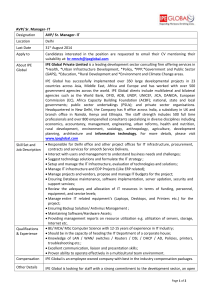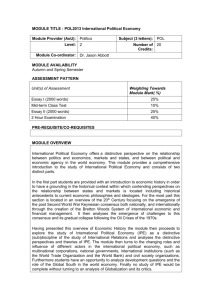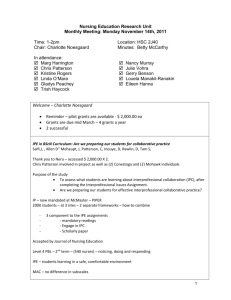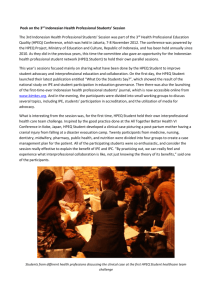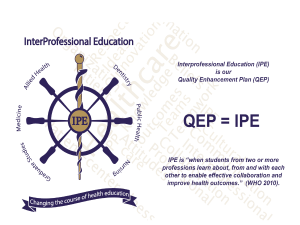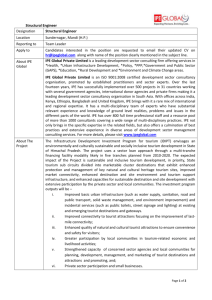Rationale/Justification for the Course
advertisement
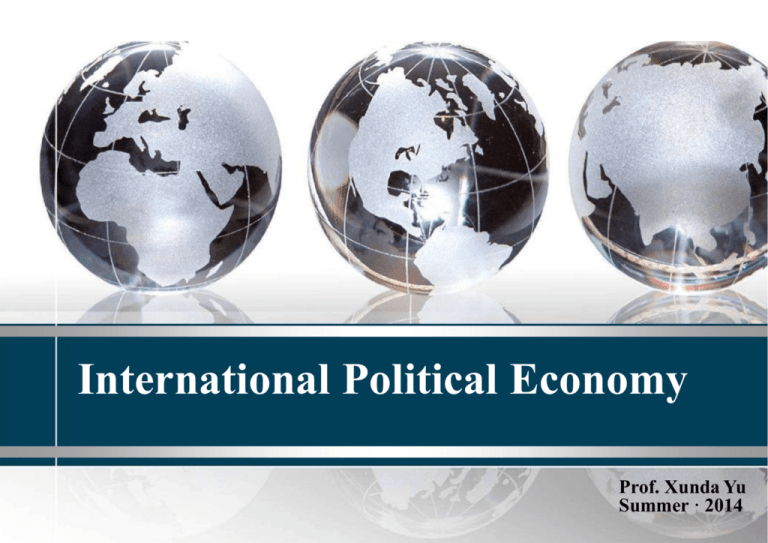
International Political Economy Prof. Xunda Yu Summer · 2014 Rationale/Justification for the Course • Within the past two decades, the world has been buffeted by the forces of globalization. This has not only resulted in the world becoming extremely interconnected in terms of culture, but economic decisions in one country are impacting politics and policies in others. This is amply exhibited by the numerous political and social changes that the world has witnessed within the past fifty years. In this context, we observe that the field of political science has been proactive to these developments. In a subfield of political science, international affairs, not only do we study topics such as the international politics, nation-states, international organizations and socio-economic development in different countries, but also other associated topics such as ideal models of economic development, globalization, north-south divide, factors influencing conflict etc. Rationale/Justification for the Course • In addition, the subfield of international affairs has also attempted to understand how political decision making and foreign policy development are impacted by socio-economic development within nation-states. Courses in political science focus on topics such as foreign policy, international relations, conflict and political violence, comparative politics, and area studies. Although all of these courses contain elements of political economy, it is imperative to have a separate course in which students can develop a comprehensive understanding of how the fields of politics and economics intersect, and how it advances the students understanding of the functioning of the global community. Rationale/Justification for the Course • As a result, the new course on political economy will focus on topics such as the relationship between politics and trade, national security and economic sanctions, migration, labor policy, sovereign wealth funds and their impact on the national security of a nation-state, the relationship between global environment and economic development, human rights and the existence of sweatshops operated by TNCs, outsourcing of jobs and its impact on policy making in the United States and China,etc. Main Message of the Course Summer 2014 Wednesday and Friday, 9:50-12:15 East--One B, room 215 Professor Xunda Yu West 3 B Building, room 211 Tel: 13515818086 Email: yuxunda2008@163.com Office hours: Monday, 1:00-3:00,PM Main Message of the Course Textbook: David N. Balaam and Bradford Dillman, Introduction to International Political Economy, fifth edition (2011). In addition to the textbook, additional readings are assigned from the class. Main Message of the Course An important component in understanding the relationship between politics and economics is being able to relate them to current political events happening across the world. Therefore in this class we will regularly be discussing world events and as students you should be aware of them. I would encourage that you should daily read a major newspaper. Another resource that you can use are websites of major news networks. (www.cnn.com, www. bbc.co.uk/news, abcnews.go.com, etc.) Main Message of the Course Objectives: The expectation is that students will leave the course with the following: 1) A basic understanding of the impact of politics and political policies on trade, finance, and investment relations. 2) A familiarity with the instruments, strategies, and motives of political institutions (both domestic and international) as they attempt to manage international economic relations. 3) Greater ability, as citizens, to understand and to participate in the public debate over the issues central to this course. Main Message of the Course Objectives: The expectation is that students will leave the course with the following: 4) Understanding of the impact of globalization on developed and developing countries. 5) Further development of critical reasoning skills, as well as skills in clear, precise writing via both in-class and take home essays. 6) Ability to present confidently their ideas to their peers, and to verbally argue about the merits of their ideas and opinions. A Brief Introduction to IPE CONTENTS OF THE BOOK Perspectives on IPE • • • • • Chap. 1: What is IPE? Chap. 2: Economic Liberal Perspective Chap. 3: The Mercantilist Perspective Chap. 4: The Structuralist Perspective Chap. 5: Alternative Perspectives on IPE States and Markets in the Global Economy • • • • Chap. 11: The Development Conundrum Chap. 12: Regionalism Chap. 13: The Rising Powers Chap. 14: The Middle East Structures of IPE • • • • • Chap. 6: The Production and Trade Structure Chap. 7: The International Monetary and Finance Structure Chap. 8: International Debt and Financial Crisis Chap. 9: The Global Security Structure Chap. 10: The Knowledge and Technology Structure Transnational Problems and Dilemmas • • • • • • Chap. 15: The Illicit Global Economy Chap. 16: Migration and Tourism Chap. 17: Transnational Corporations Chap. 18: Market Failure and Injustice Chap. 19: Dependency and Resource Curses Chap. 20: The Environment Chap.1 What is International Political Economy? 110329_Tsinghua_final_02.pptx 2 22 Content of Chap. 1 Sector 1 The Darkness on the Edge of Town Sector 2 The WHAT, WHY and HOW of IPE Sector 3 Globalization, the Financial Crisis, and State-Market-Social Relations Sector 4 Conclusion What is IPE? Suggested Readings • Thomas L.Friedman. The Lexus and the Olive Tree: Understanding Globalization.New York: Farrar, Straus and Girous,1999. • Robert Gilpin.Especially chap.1 in The Political Economy of International Relations. Princeton, NJ: Princeton University Press,1987. • William Greider. One World,Ready or Not: The Mantic Logic of Global Capitalism.New York: Simon &Schuster,1997. • Pietra Rivoli.The Travels of a T-Shirt in the Global Economy: An Economist Examines the markets, Power and Politics of World Trade,2nd ed. Hoboken,NJ:John Wiley,2009. • Joseph Stiglitz.Globalization and Its Discontents.New York: W.W.Norton,2004. • Susan Strange.States and Markets: An Introduction to International Political Economy.New York: Basil Blackwell,1988. • Kenneth N.Waltz.Man,the State,and War: A Theoretical Analysis.New York: Columbia University Press,1959. What is IPE? The Darkness on The Edge of Town The Financial Crisis The European Debt Crisis >Background: the Global Financial Crisis. The IPE method is an attempt to synthesize analytical elements of separate academic disciplines to better explain complex, real-world problems that span physical and intellectual boundaries. What is IPE? The WHAT, WHY and HOW of IPE • Today’s complex issues can no longer be easily described, analyzed, and understood by using any single set of disciplinary methods and concepts. • Learning IPE, namely, is to break down the analytical and conceptual boundaries between politics,economics, and sociology to produce a unique explanatory framework. Since each discipline offers an incomplete explanation of global events. What is IPE? The WHAT, WHY and HOW of IPE What is International Political Economy? • Firstly, we need to make a distinction between the term “international political economy” and the acronym IPE. • Second, the acronym IPE connotes a method of inquiry that is multidisciplinary. Political dimension: power, rule, institution Economic dimension: distribute resources, shape human behavior, coordinate social behavior Societal dimension: different social groups What is IPE? The WHAT, WHY and HOW of IPE Why - the benifits of IPE. • IPE represents an effort to return to the analysis before the study of human social behavior became fragmented into the discrete fields of political science, economics and sociology. • It attempts to blend together distinct perspectives to produce a more holistic explanation of the global political economy. What is IPE? The WHAT, WHY and HOW of IPE Three Perspectives: A. Economic liberalism---More associated with the study of markets and the rational behavior of different actors with them Major concern: the states’s role in the market and other parts of the economy. Orthodox Economic Liberals (OELs) VS. Heterodox interventionist Liberals (HILs) B. Mercantilism---More associated with political science, especially the political philosophy of Realism. Major concern: power and wealth C. Structuralism Rooted in Marxist analysis but not limited to it. More associated with sociological analytic methods. Major concern: How different class segments of society are shaped by the dominant economic structure? What is IPE? The Four Levels of Aanalysis eg. Kenneth Waltz: Man, the State, and war. •The Global Level---how global factors, such as changes in technology, commodity prices, and climate, create constraints and opportunities for all governments and societies. •The Interstate Level---how the relative balance of political, military, and economic power between states affects the probability of war, prospects for cooperation, rules related to transnational c orporations or the ways in which governments exercise leverage over their allies and states with mutual interests. •The State/Societal Level---how lobbying by socio-economic groups, electoral different types of governments and •The Individual Level--- What is IPE? Susan Strange's Four IPE Structures • Security Structure. • Production and Trade Structure. • Finance and Monetary Structure. • Knowledge and Technology Structure. > Those structures are complex arrangements that function as the the underlying foundation of the international political economy What is IPE? Putting the pieces together ---globalization, financial crisis, and state-market-society relations What is Globalization? An economic process that reflects accelerated and intense interconnections based on new technologies and communications systems and the mobility of trade and capital. The integration of national and regional markets into a single global market. A political process that weakens state authority and replaces it with deregulated market outcomes A cultural process that reflects a densely growing network of complex cultural interconnections and interdependence in modern society. An inevitable occurrence that has produced a new form of capitalism---hyper capitalism. A process for which nobody is in charge. It can Benefit everyone, especially economically. It furthers the spread of democracy in the world. > Thomas Friedman, The World Is Flat. What is IPE? Putting the pieces together ---globalization, financial crisis, and state-market-society relations Impacts: For economic liberalism, globalization manifested the power of unregulated and integrated markets to trump politics and greatly benefit society. However, it indeed increases the rich-poor gap. • It has a homogenizing effect on cultures the world over. • It is responsible for many of the global environmental problems. • It is also criticized for the global financial crisis. > The Impacts of Globalization. What is IPE? Conclusion Three recent major shifts in the global political economy. The definition of development is gradually away from quantifying economic growth. Global wealth and power is changing, which increases North-South tensions, as well as complicates and weakens global governance. Support for more government intervention to save both individual national economies and the entire international finance system has been renewed. > Two more questions to contemplate throughout the whole course: 1. Are the political—economic institutions of states and societies able to deal with the conflicting tendencies of making economic growth and security the highest priorities of states without destroying the earth’s capacity to sustain development? 2. Is it time for the popular economic liberal perspective to be replaced by something else that can reconcile industrialization and commercial activity with the shared need to provide proper stewardship of the earth and its natural resources? Outline of the text’s main themes 13 major themes In page 20 What we will study in this course: Chapter 1-13、15、20 What is IPE? Discussion Questions 1.Give examples of how and where states, markets, and societies interact and at times conflict with one another. How hard is it to determine the analytical boundaries between these terms in this case? 2.Review the basic elements and features of the IPE approach: the three main theoretical perspectives, the four structures,the levels of analysis,and the types of power.Which ones do you feel you understand well and which ones need more work? 3. Define and outline the major features of globalization. Which of three IPE perspectives(or combination of perspectives) about globalization do you agree with most? Explain why. 4. Based on what you have learned so far in this chapter and from reading newspaper,etc.,outline a few things you know about the connection between globalization,the financial crisis, and capitalism. 5. Do you agree with those who suggest that the financial crisis raise serious concerns about the viability of capitalism?Explain. 6. If you read the section on the main themes of the book as a conclusion to the class,discuss any three major themes that come up in two topics of your choice, either in two chapters or throughout the text. Thanks ! 2014 . 4 110329_Tsinghua_final_02.pptx
